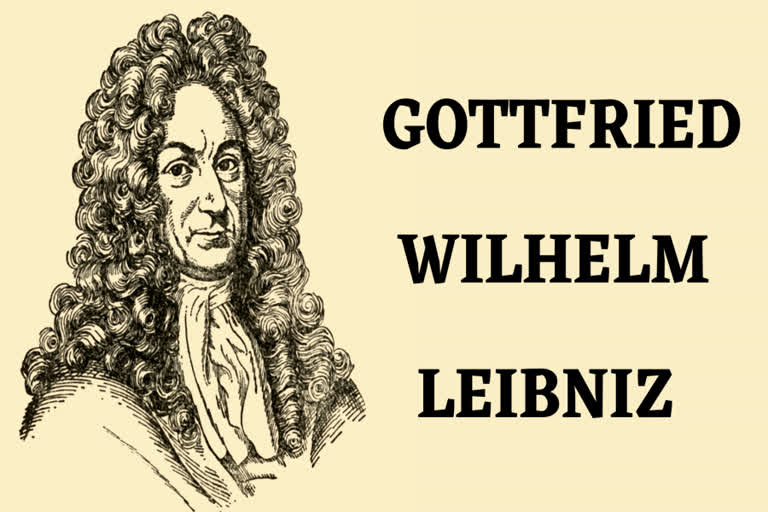Hyderabad: Gottfried Wilhelm Leibniz was born in Leipzig, Germany, on July 1, 1646. He was the son of a professor of moral philosophy.
Leibniz was born into a pious Lutheran family near the end of the Thirty Years’ War, which had laid Germany in ruins. As a child, he was educated in the Nicolai School but was largely self-taught in his father's library, who had died in 1652. Then he entered the University of Leipzig as a law student; there he came into contact with the thought of scientists and philosophers who had revolutionized their fields—figures such as Galileo, Francis Bacon, Thomas Hobbes, and René Descartes.
In 1666, he finished his law studies. Then the University of Altdorf invited him to become a professor despite his youth. Leibniz, however, declined and opted instead to pursue a career in public service.
Contributions to Mathematics
- Modern Binary System: Leibniz invented the modern binary system, which uses the symbols 0 and 1 to represent numbers and logical statements. The modern binary system is integral to the functioning and operation of computers, even though Leibniz discovered this system a few centuries before the invention of the first modern computer.
- Calculus: Leibniz’s calculus differed from Newton’s mainly in notation. Interestingly, many students of calculus today have come to prefer Leibniz’s notation. For example, many students today use “dy/dx” to indicate a derivative of y concerning x, and an “S”-like the symbol to indicate an integral. On the other hand, Newton placed a dot over a variable, like ẏ, to indicate a derivative of y concerning s, and did not have a consistent notation for integration.
- Matrices: Leibniz also rediscovered a method of arranging linear equations into arrays or matrices, which makes manipulating those equations much easier. A similar method had first been discovered by Chinese mathematicians years earlier but had fallen into abandonment.
Contributions to Philosophy
- Monads and Philosophy of Mind: In the 17th century, René Descartes put forward the notion of dualism, in which the non-physical mind was separate from the physical body. This sparked the question of how exactly the mind and body are related to one another. In response, some philosophers said that the mind could only be explained in terms of physical matter. On the other hand, Leibniz believed that the world is made of “monads,” which are not made of matter. Each monad, in turn, has its own individual identity, as well as its own properties that determine how they are perceived. The monads, furthermore, are arranged by God—who is also a monad—to be together in perfect harmony. This laid down Leibniz’s views on optimism
- Optimism: Leibniz’s most famous contribution to philosophy may be “optimism,” the idea that the world we live in—which encompasses everything that exists and has existed—is the “best of all possible worlds.” The idea is based on the assumption that God is a good and rational being, and has considered many other worlds in addition to this one before choosing this one to come into existence.
- Editions of Leibniz: As noted above, Leibniz did not publish much in his lifetime which fits the familiar description of a philosophy book. Much was published, however, shortly after his death. Several goods, inexpensive and shorter anthologies of key texts.
- Philosophical Essays. Edited and translated by Ariew and Garber. Hackett, 1989.
- Philosophical Texts. Translated by Francks and Woolhouse. Oxford University Press, 1998.
- Philosophical Writings. Edited by Parkinson, translated by Morris and Parkinson. Everyman, 1973.
Finally, editions in English of more specialized selections, the longer texts, and correspondences of Leibniz:
- The Correspondence with Clarke. Edited by Alexander. Manchester University Press, 1956.
- The Leibniz-Arnauld Correspondence. Edited and translated by Mason. Manchester University Press, 1967.
- Logical Papers. Edited and translated by Parkinson. Oxford University Press, 1966.
- The Political Writings of Leibniz. Edited and translated by Riley. Cambridge University Press, 1972.
- New Essays on Human Understanding. Edited and translated by Remnant and Bennett. Cambridge University Press, 1996.
- Theodicy. Edited by Farrer, translated by Huggard. Routledge and Kegan Paul, 1951.
Also Read: 'Moonikin' flying around Moon on NASA named after Apollo 13 engineer
(Inputs from IANS)



